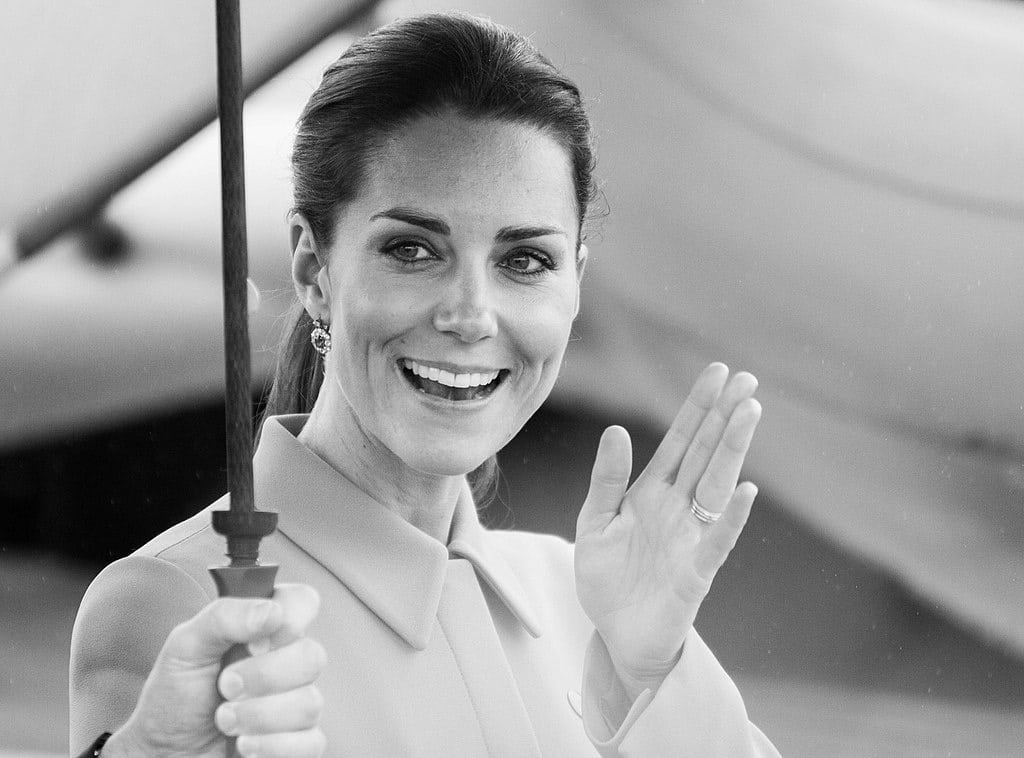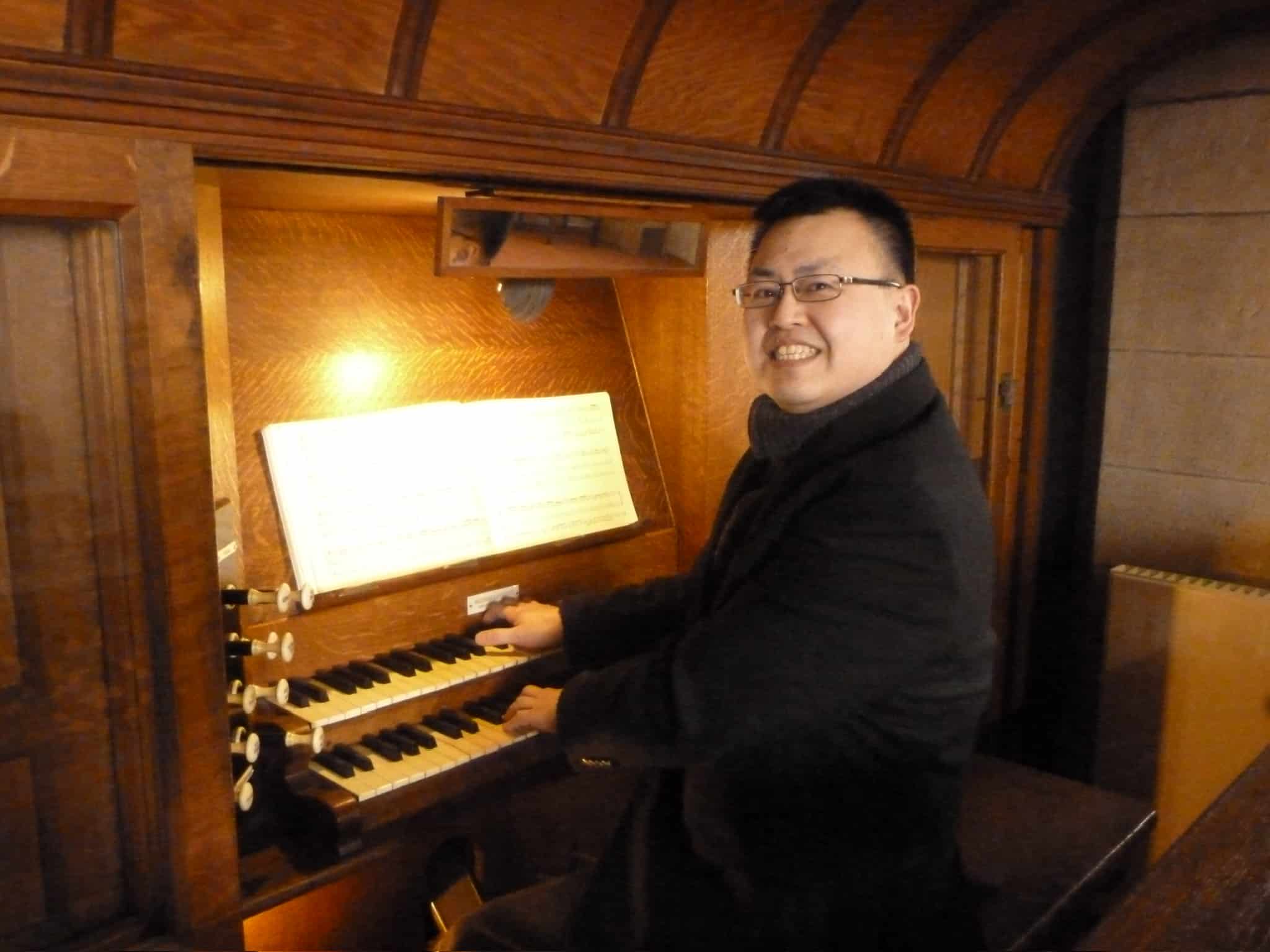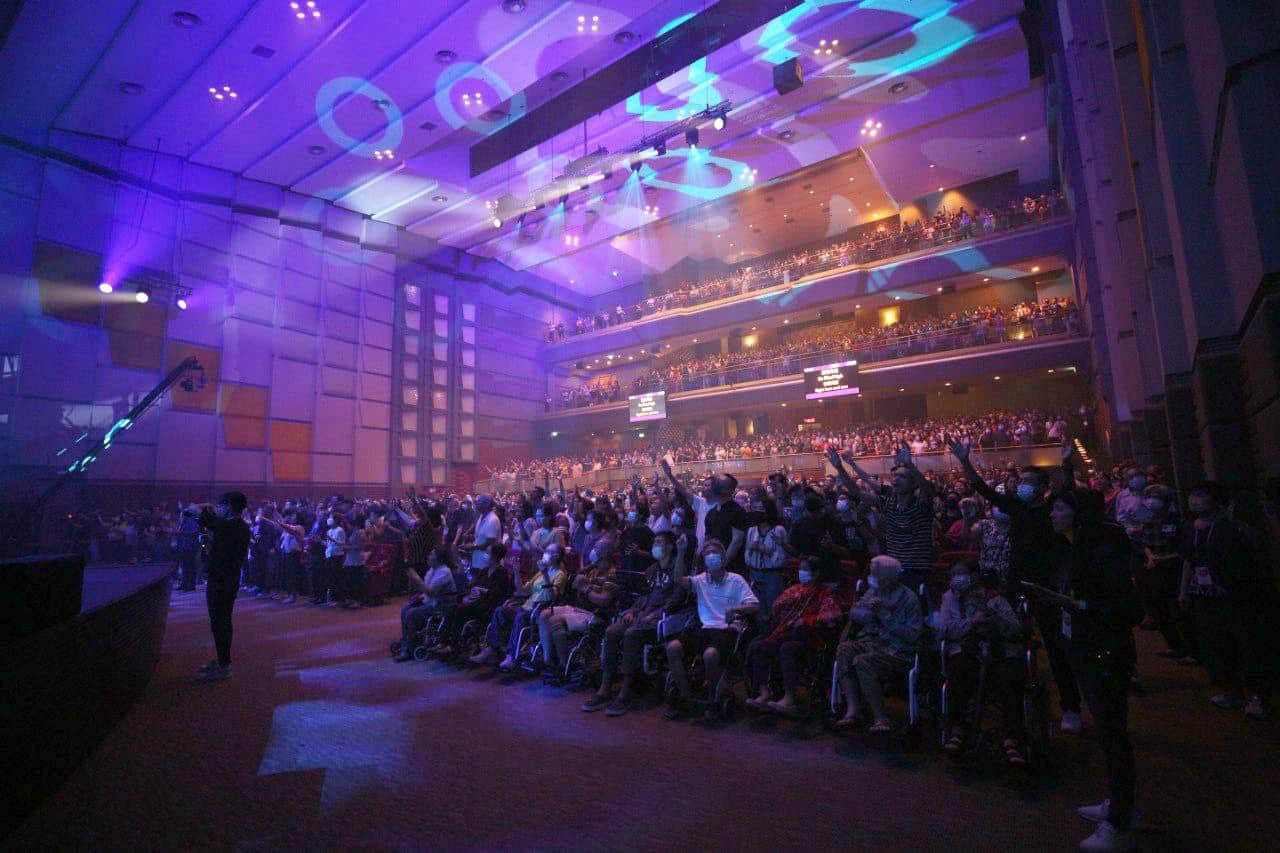“Church was my faith reserve for what was to come”: Surgeon who lost mum, slept at the airport as a teen
by Gemma Koh // May 16, 2020, 6:23 pm
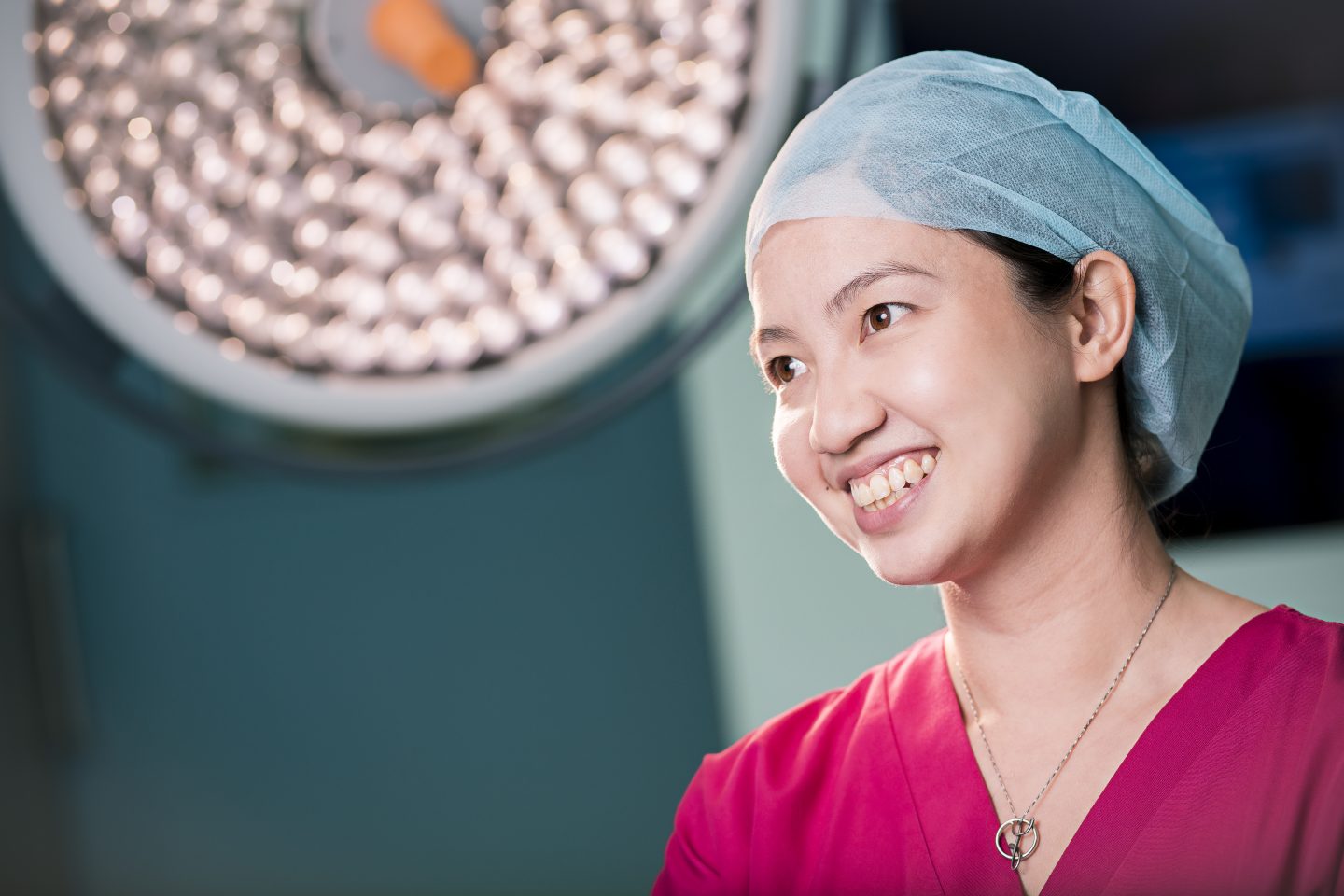
"There is no way that God didn't play a part. You realise that no one would have got out of it fine without God guiding or watching over them," said Dr Felicia Tan of her years as a teen who chose to live life on her own terms. Photos courtesy of Felicia Tan.
Breast cancer surgeon Dr Felicia Tan was going to say no to Salt&Light ‘s request for an interview.
She was feeling awkward that her life was out there for all to read after a full-page feature ran in The Sunday Times: How at age 12 she lost her mother to a car accident. How she slept at Changi Airport as a teen, and gave tuition to put herself through medical school.
Then “serendipitously”, a long time patient, a pastor’s wife, came into her office. Like many of Dr Tan’s patients, she had read the story. She thought Dr Tan’s strong testimony would be good for this particular website “that Christians go to”.
The pastor’s wife said: “I would encourage you to do it. Just think about it.”
“After she walked out of the room, I felt a peace,” says Dr Tan, 41.
“Some people say that there is no God. But there can’t be no God,” she says of this encounter, and how He’s guided her through the twists and turns that have brought her to her current point in life.
“Serendipitously”, she says, “to be the salt and light” has been her guiding principle, “something that I have held on to whenever I am faced with dilemmas”.
Losing mum
She was around seven years old when she started attending Sunday School.
“Only when my life is over, will I know why He put that event in my life when I was a kid.”
“It started with my mother who then convinced my father to attend Lighthouse Evangelism.”
Church “laid my foundation for Christianity and served as my faith reserve for what was to come in the years ahead”, she says.
Her mother was killed in a car accident when she was in Primary 6. “No other setback would hit me as hard as this one.
“I remember slumping on the wet toilet floor and screaming out to God: ‘Why me? Why take away my mother?'”
Church held her together in the following years which were “a real struggle”.
“Speedlight, the youth group, had very good leaders, and even today, we still keep in touch. They guided me and kept me really busy.
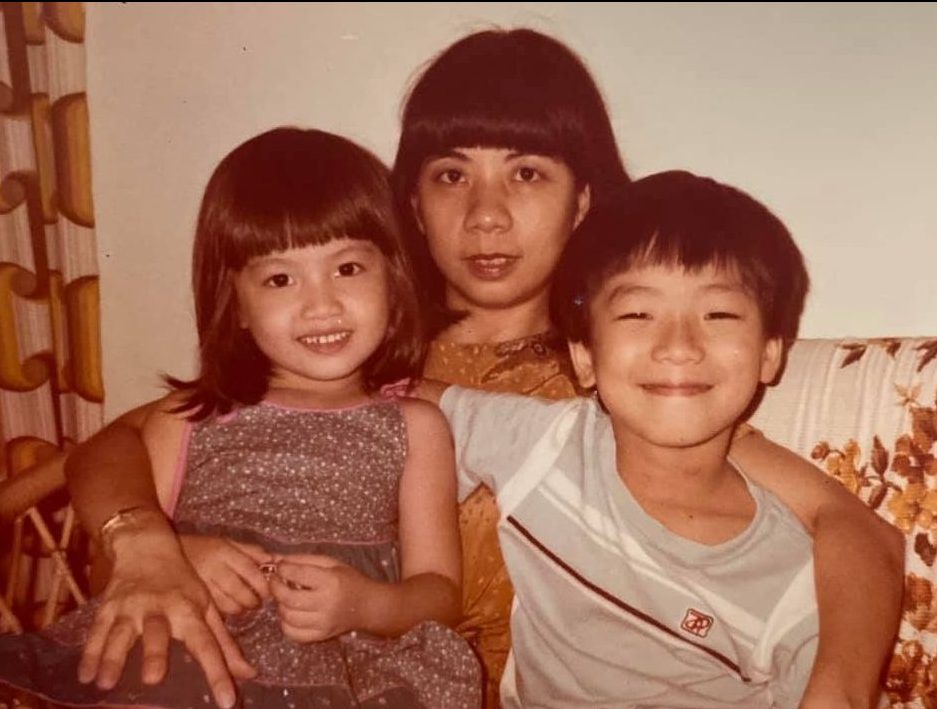
Felicia, age 6, with her older brother and their mum.
“I never blame God for anything. But I’ve asked Him why a lot of times. Sometimes the answer comes in one week, one month, one year, sometimes 20 years, 30 years. But only when my life is over, will I know why he put that event in my life when I was a kid.”
Leaving home at 16
There was much tension at home, and at age 16, she left and stayed with friends.
She had the blessing of her late grandmother, a strong, unconventional widow who single-handedly brought up seven children. “She knew that I would be fine. She only asked that I call back to let her know that I was fine.” Dr Tan gets emotional as she recalls this.
“Even when I lost my mum, the encouragement and strength to carry on, must have been God’s grace.”
She struggled to gain her own identity. “I don’t blame my father or step-mum. I don’t think I was an easy kid. I was rebellious. I was very strong headed. I was someone who would insist on doing things my own way. “
When there was nowhere to stay, she hung out in public places like the airport, in malls, in libraries, where she was unlikely to be asked to leave.
“Clearly it wouldn’t have been a safe situation for any girl. Yet there wasn’t a single time when I felt danger. Maybe that’s the benefit of staying in Singapore?”
Nor did anyone try to take advantage of her. “It was a blessing in disguise that I didn’t know about the dangers then. If my daughter were to do something like that, I would freak out!
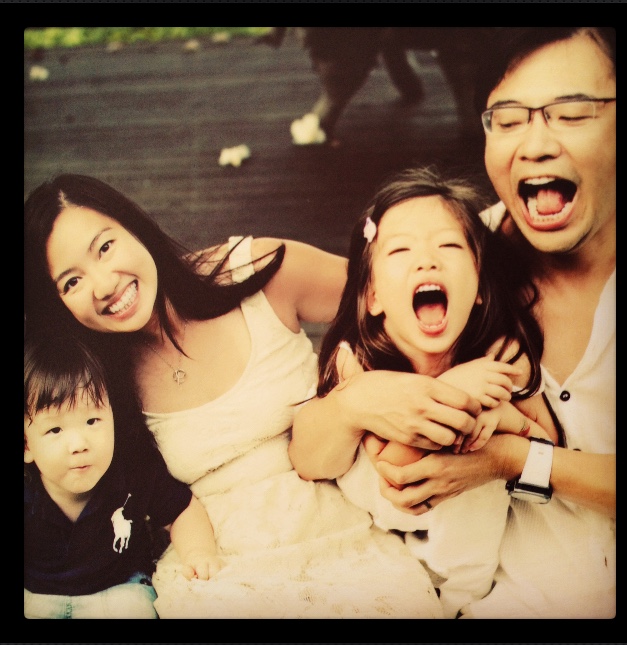
Felicia and husband, Dr Tan Yu-Meng, with their children, Gerard and Danielle, seven years ago. Their daughter is now 13, and their son 10.
“But the point is, God kept me very safe, and sent the right people to look after me.” They included a Malay security guard at the airport who made sure she wasn’t disturbed.
“There is no way that God didn’t play a part. You realise that no one would have got out of it fine without God guiding or watching over them. So even when I lost my mum, the encouragement and strength to carry on, must have been God’s grace, and Him providing the strength.”
Medicine or tuition empire?
Tan subsequently got accepted into medical school at the National University of Singapore. She had resolved to be a doctor to save lives when her mother died.
Forgotten change she found in library lockers and vending machines could pay for a meal.
She took a loan to pay her fees. Forgotten change she found in library lockers and vending machines could pay for a meal. Relatives were shocked when they found out years later, that she didn’t ask them for help. “I guess I don’t like to rely on people and I wanted to find out if I could do it on my own.”
She also gave tuition to support herself, eventually having so many students that she started conducting classes. Just before her final year in medical school, she knew she had to give up one or the other. On a trip to Myanmar, she sat on the plains watching the sunrise, contemplating for three days in isolation.
If she hung on to medicine, her salary would drop from $10,000 to $2,000 a month, and it would take her 10 years to reach what she was earning.
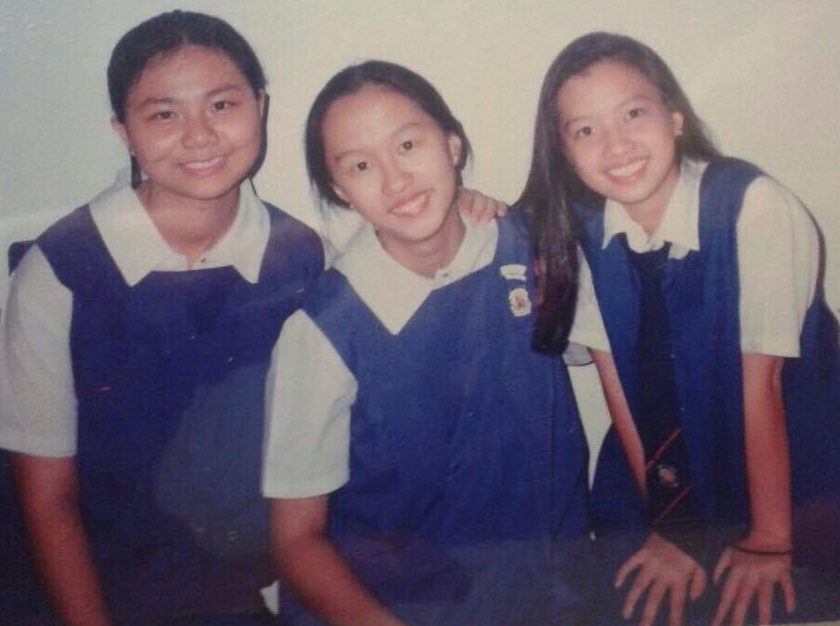
In secondary school with BFFs Jasmine (left) and Amanda (middle) who God put in her life in Primary 1. “Every time I was potentially going to do something wrong, they would pull me back and say, ‘Don’t be stupid, lah’.”
“I was cushy. I could see myself growing it into a tuition empire. Should I give up what my mum’s death was for me? Give up being a doctor, that I felt was my calling?”
She felt peace when she made up her mind. “This was a decision guided spiritually and internally by God.”
When there seems to be no way, she still takes heart in the lyrics to the song God Will Make a Way.
Fast forward to today, her surgical group practice FeM Surgery, specialising in breast, liver, colorectal and neuro, has five outlets in Singapore, one in Cambodia, and another opening soon in China. She and her liver surgeon husband founded it seven years ago.
Protecting God’s creatures
She describes herself as someone “who always likes to fight for fairness; I get very annoyed with injustice”.
This was why she became a certified travel agent in 2015, and set up Ravishing India Holidays. Plans to offer tours to Africa and Bhutan are in the pipeline.
She had found the subcontinent to be “completely different” to what her Indian patients had warned her about. They had thought she was “out of her mind” bringing her kids there.
“We do what feels right at a point in time, in our conviction and what stirs in our heart.”
“I met locals who were really kind and genuine. India is a really beautiful country. The colours were amazing. Hospitality was top notch.
“So that’s when I decided that I had to do something for this country. Yes, I’m just one person. But let me do what I can to change the mindset foreigners have of India.”
The agency specialises in bespoke itineraries on the luxurious side, allowing travellers to see the country of extremes in a different light. Safaris to see Bengal tigers are a main focus. “I sit down with officials and governments to talk to them about conservation issues, that these animals need protection to thrive. I don’t want to see the day when my kids don’t get to see a real tiger, or even a tiger in the zoo.”
Her agency co-organised the inaugural Singapore Tiger Week 2019, raising conservation awareness of the tigers, with talks from visiting naturalists. And for children, events like plays, school visits. They are launching a pictorial book this year. “A lot of Singapore students didn’t know that tigers used to roam this island.
“I don’t think anything really happens by chance.”
“Animals (not humans) are my first love,” she quips, adding that she wanted to be a vet since she could talk. She credits her father, a former science teacher, for spurring her interest, “bringing back frogs for me to cut up and taking me on nature walks”. Her current home is quite a “farm” that includes dogs, quails and bunnies.
The serial entrepreneur says her ventures are not just about turning a profit. “The end result is to help.”
Whatever business she sets up and the people she brings on board are driven by two things: One, passion for doing what you love – “a true love for your art, in medicine, for example”. Two, compassion.
“You can’t teach people compassion. You can’t pay people more to be compassionate. They just need to have it in them. So this kindness and compassion to want to help others to want to do good all the time is very, very important.”
The Dalai Lama
Dr Tan’s travel business is distinct from the medical missions that she organises several a year through FeM Angels, the CSR arm of her surgical group practice. Yet, through it, have come requests and opportunities, such as a medical camp last year at Kumbh Mela, a major festival that attracted 120 million people.
She also met the Dalai Lama’s team in Nagaland during the Hornbill Festival. “It wouldn’t have happened if I wasn’t at the right place at the right time,” she says.
“When you finish your life’s journey, all the dots will join. And you will realise God’s hand in the entire roadmap.”
“I don’t think anything really happens by chance. I always say to people and my kids: I think at the end of the day, when you finish your life’s journey, all the dots will join. And you will realise God’s hand in the entire roadmap.
“I think it was it was pre-planned. I don’t know where this will lead us. We do what feels right at a point in time, in our conviction and what stirs in our heart. I think that would be what God wants for us.”
The Nagaland trip allowed her to attend the festival, and thereafter take in the Christmas decorations.
“I was intrigued to go to a place in India that is largely Christian,” she says of the area in north-east that had a long history of head hunting. “The missionaries who persisted in trying to spread the Gospel there converted over 90% of the population.”
At the Hornbill Festival, she was called to examine a high-ranking monk who had fallen ill at the camp where she was staying.
She started chatting with the monk, who asked if she could look into the high rate of gastric cancer among young monks at the Dalai Lama’s monastery in Ladakh. So serious were they about treating the community, that they arranged for 10kg of vegetables and water for her to take back to Singapore to test for carcinogens in the preserved vegetables, a mainstay of their diets, and also test for possible water-borne bacteria in the stream water they drink.
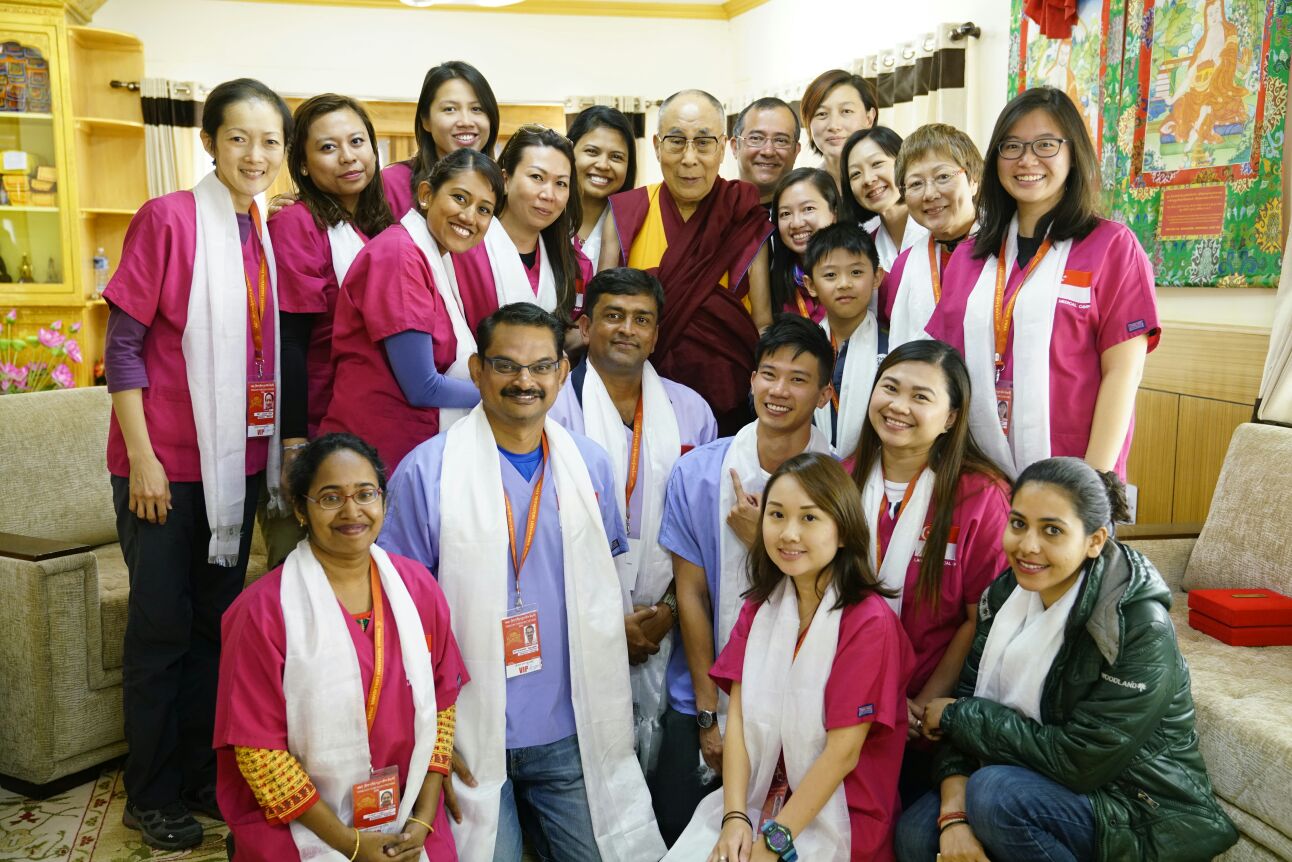
The medical team from Singapore with the Dalai Lama at the end of a mission in August 2016. They had treated thousands with a wide range of ailments. “We laughed and joked as HH Dalai Lama told us stories of his carefree, playful childhood in Tibet. He held no hardness or hatred despite so many injustices he’s been through.”
The test results were negative. In fact, “the water quality was very good”. That left h.pylori as the main suspect. So she took 10,000 test kits with her to the monastery in the Himalayas. “When we tested the monks, we realised that 80% had this bacteria, which is shocking. In Singapore, the incidence is about 10%.”
The affected monks were given two weeks of antibiotics. “We are following up to see whether this will bring down the rate of gastric cancer. If it does, then this is a really simple problem that just needs antibiotics to resolve.”
Medical missions are currently on hold because of current COVID-19 travel restrictions. But she ensures that her beneficiaries have the supplies that they need.
“As long as it doesn’t kill you, you can overcome the disease or manage a chronic condition.”
She also works with the Maldivian Cancer Society and Bali Pink Ribbon, amongst other NGOs. She worked closely with the expat women to set up the latter.
Bali was where her heart for medical missions started, just after the bombing in 2002, when tourists were staying away.
“The people were saying thank you for having your wedding here. They were so grateful that we were bringing in some form of business – even though not huge – to support them.
“That’s when I decided – I’ve been taking so much from this little island. I go there on holidays. I buy my furniture for my home there. It’s about time I give these very genuine, sincere people the only valuable skill I have: My medical skill.”
The aim is “not for me or my team to keep going but to be the catalyst to excite the local doctors and community to come onboard and take over”.
Illness is not a dead end
In life, Dr Tan’s philosophy is: “I almost never see anything as a problem. I will see it as something to overcome. And once we overcome this, then I would be so much stronger than I was months ago when I didn’t have this challenge.”
These are lessons from God, she says, who “wants to teach you and wants to train you … and these are things that build you up.
“One thing that a lot of people find very difficult to grapple with is illness: If God really loved you, why is He giving sickness to anyone?”
“God wants to teach you and wants to train you … these are things that build you up.”
“Illness shouldn’t be seen all the time as a dead end. I always tell my breast cancer patients, ‘This is not a death sentence. As long as it doesn’t kill you, as long as you’re still alive, you can overcome the disease or you can manage a chronic condition. As long as you learn how to manage it, you are learning every day and you’re becoming stronger every day.'”
She’s seen how her patients “have changed from being maybe emotionally fragile when I first met them to very independent, strong-willed, self-sufficient women.”
She’s seen the same of her daughter, Danielle, now 13.
“She’s turned out to be a really independent and strong girl. Stronger than most teenagers.”
Danielle was born with with congenital myopia, an eye disorder which occurs in early childhood. It was only diagnosed when she was 18 months old. Dr Tan switched from liver to breast surgery to have time for her care, which involved numerous treatments and physiotherapy.
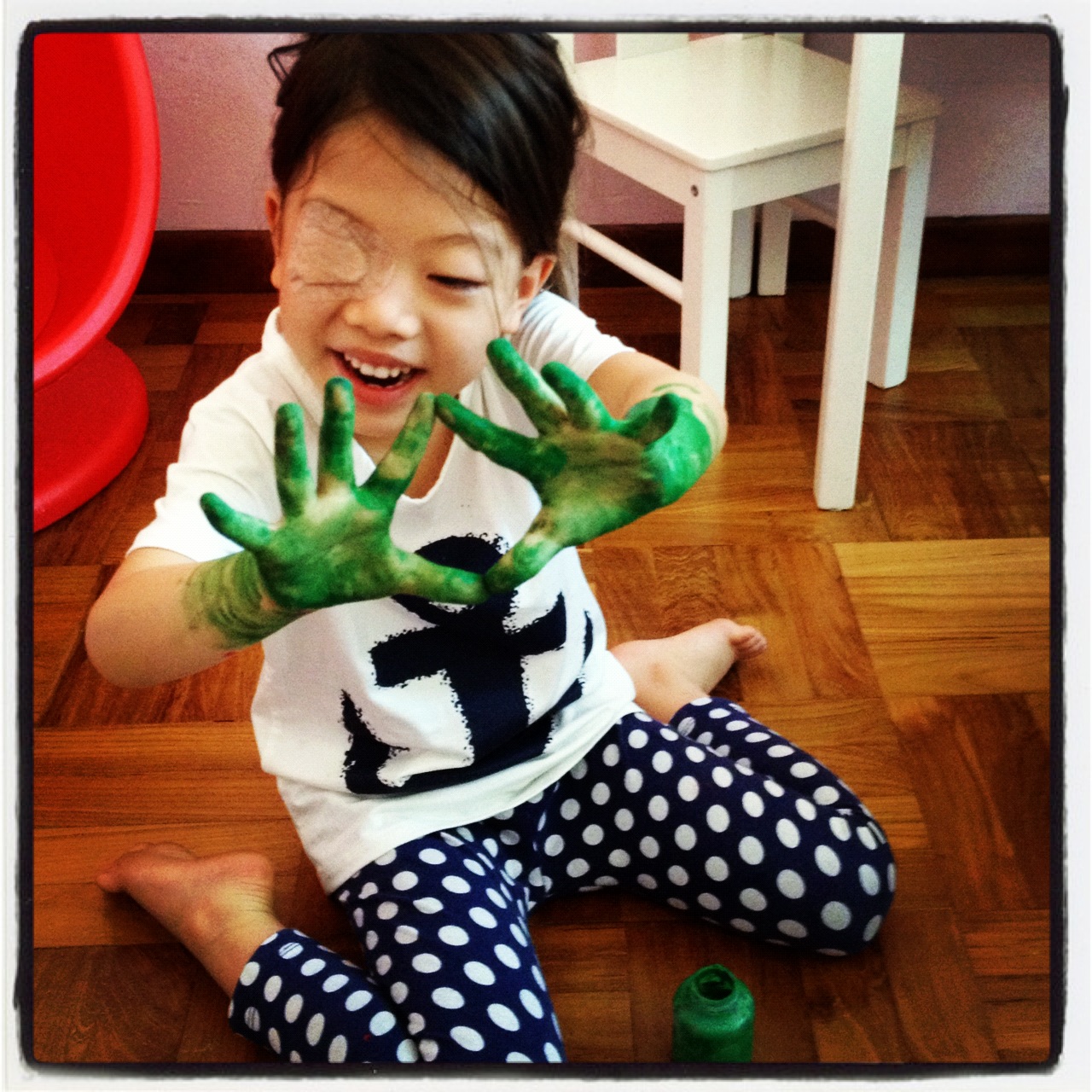
Danielle at age 4. “If her eye was perfectly normal, she’d grow into maybe a kid who’s quite spoilt. Because her parents give her everything. But because of the eye condition, she’s learnt how to treasure things, how to be independent, how to take care of herself. You don’t learn through good times. You learn through bad times,” said Felicia.
“Imagine putting a contact lens in an 18-month-old. It was a nightmare, holding her down and trying to fit the contact lens in every day,” she says. By Primary 1, Danielle was able to do this on her own.
Danielle has also had two surgeries. “As a surgeon, I inject and cut people every day. But to see your daughter undergo the same thing is very heartbreaking.
“God’s guiding hand and plan is at work.”
Two days after Dr Tan’s chat with Salt&Light, Danielle was diagnosed with Graves’ Disease, an autoimmune disorder which is usually chronic and lifelong.
“So serendipitous as we were chatting about being inflicted with diseases and what it meant … ” Dr Tan WhatsApps.
“So I shared the same message with my daughter and that helped her cope with the diagnosis and accept it as a challenge to overcome. At first she cried and was devastated, but now she is taking it a lot better and is being proactive with her diet and treatment. She’s even said she wants to be the fastest person to recover from this disease.
“She is taking it much better than I thought she would … tough cookie.
“Speaking with Salt&Light crystallised my thoughts on the matter and made it easier for me to help her as a mother. Once again, God’s guiding hand and plan is at work.”
https://saltandlight.sg/news/god-is-not-limited-by-oceans-or-time-zones-online-healing-room-in-singapore-receiving-global-calls/
We are an independent, non-profit organisation that relies on the generosity of our readers, such as yourself, to continue serving the kingdom. Every dollar donated goes directly back into our editorial coverage.
Would you consider partnering with us in our kingdom work by supporting us financially, either as a one-off donation, or a recurring pledge?
Support Salt&Light